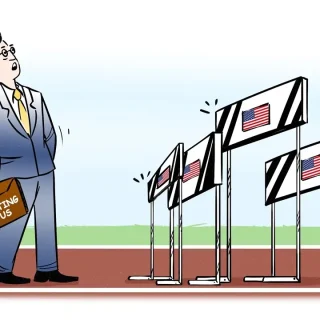Asset Management’s Humble Year
2023 demanded humility from asset managers as the bond market defied predictions, challenging even the most seasoned investors. Bets against the Federal Reserve’s relentless interest rate hikes repeatedly fell short, especially post the Silicon Valley Bank crisis. As yields soared, the market’s consensus shifted, expecting the Fed to maintain high rates longer and then pivot to substantial cuts. This dual expectation sets the stage for an inevitable confrontation with reality in 2024.
Big Tech’s Unshakeable Dominance
In the stock market, Big Tech’s supremacy remained unchallenged, with a select few companies dominating global markets. Investors, whether indexing or seeking resilient stocks tied to trends like artificial intelligence, found themselves inevitably drawn to these tech giants. This trend highlights a seemingly invincible market dominance that begs the question: what, if anything, can derail these technological titans?
The ESG Controversy Intensifies
The backlash against environmental, social, and governance (ESG) investing escalated in the US, with 18 states enacting anti-ESG laws. Prominent political figures rallied against what they termed “woke capitalism,” targeting entities like BlackRock for their ESG advocacy. Despite this, investments in sustainable initiatives continued, with significant allocations to projects like Occidental Petroleum’s carbon capture endeavor. The controversy underscores a growing divide between traditional investment strategies and the rising tide of socially conscious capital.
The Fall of Crispin Odey
Odey Asset Management, once a symbol of the City’s old guard, faced a reckoning following allegations of sexual misconduct against its founder, Crispin Odey. The firm, which had managed billions, saw rapid disintegration as partners severed ties and assets were relocated. Odey’s downfall, marked by legal battles and a firm in dissolution, serves as a cautionary tale of accountability and culture in finance.
Multi-Manager Hedge Funds Under Scrutiny
The multi-manager hedge fund model, once a beacon of growth, began showing cracks. As these funds grappled with capacity issues, talent wars, and rising interest rates, the industry faced calls for consolidation and reevaluation. The once-lauded model now confronts a future of increased scrutiny and potential reformation.
Regulating the Shadow Banking Sector
After years of tightening regulations on banks, global regulators turned their attention to the shadow banking sector, where risk-taking had migrated. The rise of complex trades and leveraged lending practices in this less-regulated space prompted a regulatory response aimed at increasing transparency and limiting leverage. This shift signifies a broader effort to mitigate systemic risks outside traditional banking channels.
Remembering Charlie Munger
The year also saw the passing of investing legend Charlie Munger, Berkshire Hathaway’s vice-chair. Munger, known for his partnership with Warren Buffett and his distinctive investment philosophy, left an indelible mark on the financial world. His legacy continues to influence and inspire investors globally.
Conclusion: Anticipating the Future
As 2023 draws to a close, the financial landscape reflects a world in transition, marked by resilience in the face of uncertainty and a readiness to confront long standing challenges. The year’s events — from market unpredictability to regulatory shifts and industry reckonings — not only shaped the immediate future of finance but also set the stage for a new era of informed, ethical, and adaptive investment practices.










